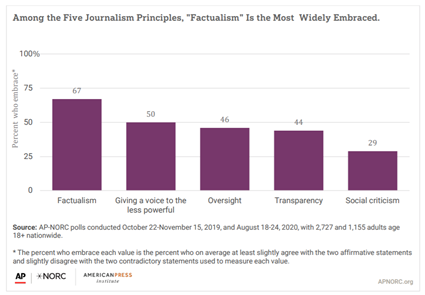

Behind the headlines: Values, trust and media
This article is from a previous issue of our Get Smart About News newsletter for the general public, which explores timely examples of misinformation as well as press freedom and social media trends and issues. Subscribe to our newsletters.
By Hannah Covington

It can be tempting to view the public’s distrust of the news media as simply a matter of political differences. But a recent study offers new ways of looking at and addressing the “media trust crisis.” It suggests that not all Americans embrace the core values that journalists follow in their work, and that this misalignment — rather than partisanship — may help better explain media trust divides. For example, people who value authority and loyalty may be wary of journalists’ role as watchdogs over the powerful.
“When journalists say they are just doing their jobs, in other words, the problem is many people harbor doubts about what the job should be,” the report said.
The study was released on April 14 by the Media Insight Project — a collaboration of the American Press Institute and The Associated Press-NORC Center for Public Affairs Research — and examined “public attitudes toward five core values of journalistic inquiry.”
Most agree on importance of facts
These values include acting as watchdogs over powerful people; making information open and transparent; valuing facts in pursuit of truth; offering a voice to those lacking power; and shining light on societal problems.

Only 11% of Americans fully embrace all five of these principles, the study found. The importance of facts in pursuit of truth attracted the most widespread support (67%), while just 29% of Americans embraced spotlighting social problems as an effective way to solve them. Distrust among these groups, the study points out, “goes beyond traditional partisan politics.”
The study highlights ways that news organizations can rebuild trust without compromising core values. Simple tweaks to headlines, first sentences and story framing, for instance, can go a long way to broaden the appeal of news reports among a wider audience.
Related:
- “American Views 2020: Trust, Media and Democracy” (Gallup and Knight Foundation).
- “Americans See Skepticism of News Media as Healthy, Say Public Trust in the Institution Can Improve” (Pew Research Center).
